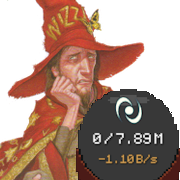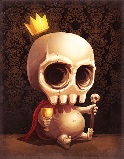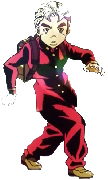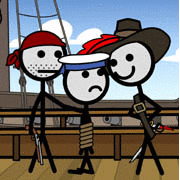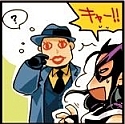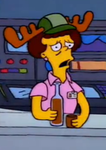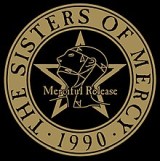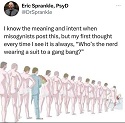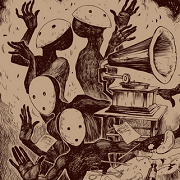|
There's definitely something confusing in the fact Joe is a good northern lad, who at a book signing of the first book in the trilogy, acknowleged CURRENT EVENTS IN THE UK, seemed to end the trilogy on a very hopeless both-sides centrist note. (Despite the inferred Corbyn references earlier in the thread)Ccs posted:Are there any fantasy authors who have written successful proletariat revolution stories? Even China Mieville, avowed socialist, didn't have his proletariat win. He just turned it into a metaphor about how the ideal revolution is always imminent but will never arrive. Pratchett certainly made progress painfully incremental, but at least drove towards it.
|
|
|
|

|
| # ? May 12, 2024 22:30 |
|
Relevant Tangent posted:All the effective leaders got murdered, all that's left are the Burners. This would actually be a somewhat interesting direction for them to go with it, but if Vick and Pike haven't figured it out themselves I'm not sure who's around to remind them Crespolini posted:How should the revolution have worked out? There being at least one non-caricature-punchline person working for it, who is featured prominently and really wants it to work and has some sort of character arc, is something I would have settled for, and Abercrombie has literally managed this for the Dow and Nightfall administrations in the North so I really feel like he should have been able to pull it off for the Union Republic. As mentioned before, there's still time for this to happen since I'm really not that far into the book yet, but I don't know if there's precedent for a new POV character halfway through? (again, Broad doesn't really count since he doesn't wanna be there in the slightest and hates his job and life) (same with Vick, who at any rate is a cop) Ccs posted:Are there any fantasy authors who have written successful proletariat revolution stories? Even China Mieville, avowed socialist, didn't have his proletariat win. He just turned it into a metaphor about how the ideal revolution is always imminent but will never arrive. Brian McClellan's Powder Mage series takes place in the aftermath of a revolution that is complete by literally chapter 2 of book 1, although it's more of a military coup in its actual methods. Most of its POV characters work for the new regime, and none of them work for the old one. loquacius fucked around with this message at 21:58 on Oct 11, 2021 |
|
|
|
The coolest character in the whole trilogy was a Breaker from I think book 2 who killed a Knight of the Body with a big hammer and got a couple pages of POV before getting murked by Sulfur Was he perfect? No. Did he have a lasting impact on the plot of the book? No. But goddammit for one brief moment in a story about a revolution, a radical was allowed to be cool, rather than someone for a sensible moderate to be embarrassed by. e: Isern is also cool e2: and Shivers loquacius fucked around with this message at 22:16 on Oct 11, 2021 |
|
|
|
You mean the Breaker that played party to the plan to blow up a bunch of innocent people for an assassination plot? That guy? If you see arguments for centrism in this trilogy I think you're adding too much of your own biases to the text.
|
|
|
|
Yeah, him. We might be using different definitions of "cool" I think? Whirrun of Bligh willingly fought to extend the reign of Black Dow, one of the worst people in the series, and Whirrun was also cool as poo poo. Glokta literally tortured people and sent innocents and their families off to a lifetime in a forced labor camp and was very occasionally cool! I've thoroughly outlined the reasoning behind my reading, though. Everybody has biases (even centrists!) and they're inseparable from our readings of all media we consume.
|
|
|
|
If you're going to call Vick a cop as a way of dismissing her then I'm surprised you're cutting Glokta any slack.
|
|
|
|
loquacius posted:Brian McClellan's Powder Mage series takes place in the aftermath of a revolution that is complete by literally chapter 2 of book 1, although it's more of a military coup in its actual methods. Most of its POV characters work for the new regime, and none of them work for the old one. Yeah I was thinking this was sort of closest. Mercedes Lackey’s Valdemar works are set in a semi-socialist semi-utopía but the founders simply hosed off out of a collapsing empire rather than actually revolted.
|
|
|
|
If you're in the House of Questions you're hosed anyway. At least if you draw Glotka you get the comedy stylings of Practical Frost.
|
|
|
|
loquacius posted:This would actually be a somewhat interesting direction for them to go with it, but if Vick and Pike haven't figured it out themselves I'm not sure who's around to remind them You really shouldn't click on spoilered text until you finish the book, but if you insist...that is the direction they went with it, and Pike was in on it. Heck, he supervised it. Remember the 200 handpicked executions after Vallbeck? Broad keeps thinking back to it, musing how things might have been so different if only whatshisname was still around but oh, all that's left are Judges and Risenaus.
|
|
|
|
My rapid update is that I've now gotten to the part of the book where Judge has her turn, and I'm already feeling better about it, because the book now feels less like Joe Abercrombie is looking directly into the camera and saying "this is my opinion on social reformers" and more like an allegorical tour of various historical revolutions. We've gone straight from the English Civil War to La Terreur. Maybe we'll end up somewhere good by the end? Lmao probably not.Relevant Tangent posted:If you're going to call Vick a cop as a way of dismissing her then I'm surprised you're cutting Glokta any slack. That wasn't meant to dismiss her but more to characterize her feelings toward the revolution. One can imagine that if Glokta were present for this and miraculously still alive, he'd feel at best the same way Vick does but more likely kind of like Orso does about it. Also as previously mentioned my definition of coolness in a fictional character is entirely separate from their moral purity; villains are frequently cool. Even Bayaz was cool a few times -- telling off Caurib in his first chapter, the exploration of the House of the Maker, and his bringing Calder into the fold stand out as examples.
|
|
|
|
I will say, I think when you've finished the book you're going to be just as disappointed in the writing but for a very different reason.
|
|
|
|
Bayaz going all Palpatine with SEVEN SEALS AND SEVEN SEALS REVERSED at the end of Last Argument of Kings was pretty sick too
|
|
|
|
Bayaz generally owns whenever he loses his cool. Whipping Jezal like a dog, then responding with laughing incredulity at his declaration of hatred. 
|
|
|
|
Crespolini posted:Bayaz generally owns whenever he loses his cool. Whipping Jezal like a dog, then responding with laughing incredulity at his declaration of hatred. In the audiobook version, Steven Pacey does a phenomenal job in that chapter. That and the chapter in BSC after Shivers wakes up from his fever dream after losing his eye, “It should have been you” are top tier. Magitek fucked around with this message at 19:45 on Oct 12, 2021 |
|
|
|
multijoe posted:Bayaz going all Palpatine with SEVEN SEALS AND SEVEN SEALS REVERSED at the end of Last Argument of Kings was pretty sick too See, this is what I missed in this latest trilogy. Bayaz was so cool and enigmatic in the earlier books.
|
|
|
|
Paddyo posted:See, this is what I missed in this latest trilogy. Bayaz was so cool and enigmatic in the earlier books. Yeah, his very last chapter was cool, but every other appearance was not
|
|
|
|
Magitek posted:In the audiobook version, Steven Pacey does a phenomenal job in that chapter. That and the chapter in BSC after Shivers wakes up from his fever dream after losing his eye, “It should have been you” are top tier. Steven Pacey elevates these books hard. I read most of them in print and liked them very much, but heard through Pacey's voice they are S tier content. His excellent stable of voices paired with Abercrombie's skill at writing a distinct voice for character's dialog really makes the cast pop to life. I wish he'd done more audiobooks that I was interested in, because he is a total vocal stud.
|
|
|
ulmont posted:Yeah I was thinking this was sort of closest. Mercedes Lackey’s Valdemar works are set in a semi-socialist semi-utopía but the founders simply hosed off out of a collapsing empire rather than actually revolted. There’s also Graydon Saunders’s Commonweal books, which are basically what if the world was run by wizardly God-Kings but a bunch of them pooled sovereignty to make a sustainable egalitarian socdem kind of system. Someone in the main SFF thread described it as “The Culture but the Minds were wizards” and I think that’s right. It’s not about the proletariat rising up though; I always thought that was more of a conceptual thing than a real one anyway. Let the vanguard run the real revolution and then make iconic movies down the road about mass crowds storming the winter palace.
|
|
|
|
|
Catching up on the thread after finally finishing the book; I saw a bunch of people mentioning KJ parker, any particularly recommended starting places for his works? I can see he has a bunch of trilogies but I can't tell if you're supposed to read them in chronological order or not
|
|
|
|
I'd go with Sixteen Ways to Defend a Walled City. The third book either came out recently or will soon be released. All his books share a lot of names and places, but it's more he seems to like to re-use names rather than them being in the same setting.
|
|
|
|
Darkrenown posted:I'd go with Sixteen Ways to Defend a Walled City. The third book either came out recently or will soon be released. or it's the same setting but hundreds if not a thousand plus years apart
|
|
|
|
Ainsley McTree posted:Catching up on the thread after finally finishing the book; I saw a bunch of people mentioning KJ parker, any particularly recommended starting places for his works? I can see he has a bunch of trilogies but I can't tell if you're supposed to read them in chronological order or not I think The Engineer trilogy is his best long trilogy, followed closely by Two of Swords which was a serial that became compiled into a trilogy. His best book imo is The Folding Knife. It's a quick read so it could give you a good sense whether you'll like Parker.
|
|
|
Ainsley McTree posted:Catching up on the thread after finally finishing the book; I saw a bunch of people mentioning KJ parker, any particularly recommended starting places for his works? I can see he has a bunch of trilogies but I can't tell if you're supposed to read them in chronological order or not The Engineer Trilogy is my favorite and the one I recommend starting with. I agree that The Folding Knife is a good litmus test, though.
|
|
|
|
|
Ccs posted:Are there any fantasy authors who have written successful proletariat revolution stories? Even China Mieville, avowed socialist, didn't have his proletariat win. He just turned it into a metaphor about how the ideal revolution is always imminent but will never arrive. Kim Stanley Robinson's Mars Trilogy. Fire on the Mountain by Terry Bisson. Maybe William Morris’s News from Nowhere would count but that is more of a future history than a sci-fi/fantasy per se. Edit)I've never read it but what about Red Rising by Pierce Brown? Then we'd have to quibble over the differences between a revolution of the oppressed classes vs a coup by a member of the oppressed class that thinks he can reform society. Yadoppsi fucked around with this message at 13:15 on Oct 15, 2021 |
|
|
|
Red Rising is absolutely about coups. Also the “good guy” team is implausibly ineffective when the plot needs them to be.
|
|
|
|
|
Not far into The Wisdom of Crowds and I'm finding it pretty disappointing. Sure, the book deals with the lovely aspects of revolution, but besides the satire being incredibly on the nose, it feels like the characters are just enacting the historical revolution playbook as if they're aware of it. Like, this is supposed to be the first one in their world, and they're already getting paranoid about counterrevolutionary threat before one has actually manifested, etc. If you read about the story of the French Revolution, it's fascinating because nobody involved had any idea what they were doing or what would happen tomorrow. They started off enthusiastic and full of hope, and the problems all crept up on them gradually until they turned into the Terror, the reaction and then bonapartism. It was to be a template for many revolutions to come, but at the time it was new territory for them. You don't get that sense here at all. It's like they all have a blueprint in their heads for "this is what a revolution looks like" despite being in the first one ever. It's somehow... rote. I hope it gets better later, maybe?
|
|
|
|
Hi kids. No idea what this forum is about anymore, but I have posts talking about my first experience with The First Law trilogy all the way back in 2012 in this very thread. Gotta say, Joe is still my #2 fantasy writer, but this trilogy overall was disappointing for me. Especially Wisdom of Crowds. Just ultimately didn't like where the story or any of the characters landed, and didn't like the hint of things to come sounded more interesting than the actual story of this trilogy. It also felt like the continued trend in writing and film "subvert expectations" without finding a satisfying replacement for the trope being subverted. That's all I say, don't remember how to spoiler tag things so I just tried to keep it vague.
ataridc fucked around with this message at 00:29 on Oct 18, 2021 |
|
|
|
Guildencrantz posted:Not far into The Wisdom of Crowds and I'm finding it pretty disappointing. Sure, the book deals with the lovely aspects of revolution, but besides the satire being incredibly on the nose, it feels like the characters are just enacting the historical revolution playbook as if they're aware of it. Like, this is supposed to be the first one in their world, and they're already getting paranoid about counterrevolutionary threat before one has actually manifested, etc. I'm maybe a third through the book and pretty unconvinced. We have bits and pieces of the French Revolution flying around, but they don't really make a lot of sense without the context of the General Estates. Setting up an assembly including members of the old nobility doesn't seem to follow naturally from taking over the capital militarily.
|
|
|
|
Guildencrantz posted:Not far into The Wisdom of Crowds and I'm finding it pretty disappointing. Sure, the book deals with the lovely aspects of revolution, but besides the satire being incredibly on the nose, it feels like the characters are just enacting the historical revolution playbook as if they're aware of it. Like, this is supposed to be the first one in their world, and they're already getting paranoid about counterrevolutionary threat before one has actually manifested, etc. I consider it a reasonable reaction, considering the walking counterrevolutionary threat that was Yoru Sulfur. The guy single-handedly dismantled one uprising by posing as its leader and surrendering to Jezal for some token concessions. The rebels were radicalized by a failed uprising in Valbeck, where the reasonable part of their leadership was talked into laying their arms, then hanged; an army of loyalists was still prancing around Midderland, and the overseer of the entire revolution was the former vice-director of the royal NKVD. Pointing fingers at traitors sabotaging their vision is a go-to of every fuckup leader in the world, but in the universe where the Illuminati actually exist and control the banks a hidden counterrevolutionary fifth column is actually a good assumption. Edit: Not to mention the closest person to Satan in this world destroying the Old Empire by infiltrating it with shapechangers and sowing discord. Gantolandon fucked around with this message at 10:24 on Oct 18, 2021 |
|
|
|
I already had a whole big rant about how annoying and centrist I thought the treatment of the revolution in the first third or so of the book was, I'm about halfway done now and I'm cautiously optimistic that the narrative might at least go somewhere I find satisfying even if I'm still kind of rolling my eyes at certain centrist tropes I've seen IRL get worked into the narrative like the Purity Officers, overseers seeded into the People's Army to make sure every military decision is politically correct, which actually sounds pretty on-the-nose for what your Republican uncle thought the US military would become under Obama, and "purity" of course being a centrist buzzword meaning "criticisms of someone I like" definitely feels like bonapartism is on the way tho
|
|
|
|
ataridc posted:It also felt like the continued trend in writing and film "subvert expectations" without finding a satisfying replacement for the trope being subverted. if this were any other thread I'd start a Star Wars derail  We can probably blame George RR Martin for this overall trend IMO. The Big One at the end of AGOT (everybody knows what I'm talking about) made a whole bunch of people super fixated on the idea of subversion without really thinking too hard about how he made it actually work
|
|
|
|
While I'm talking I'll also add that there was a line from a Savine chapter where she considers the possibility that things actually had only gotten noticeably worse for her and her friends, while they had been this bad for everybody else her entire life, that did make me feel better Conversely, Orso's doubts come off more as navel-gazing rather than sincerely-held insights
|
|
|
|
loquacius posted:
Pretty sure the og French Revolution had those. But they also had a problem with generals going over to the Austrians. Also the Austrians. Because the Union is a continental power with no real military threat, so all the French parallels just stick out.
|
|
|
|
I will say most of the 'god could he be any more cliché Revolution' bits are actually direct pulls from the French Revolution. The problem is he has the timescale accelerated and doesn't do a really great job of conveying how much time has come forward anyway. And of course the whole thing turns out to be a convoluted plot to just get rid of Bayaz and nothing else anyway.
|
|
|
|
While it certainly wasn’t his strongest book I still liked it a lot. I probably missed something obvious but who’s the black haired boy at the end with Clover? Also I really dug the set up at the end with Rikka’s long eye vision. Are we supposed to have any inkling who the creepy monster who speaks at the end of the vision is supposed to be?
|
|
|
|
genericnick posted:Pretty sure the og French Revolution had those. But they also had a problem with generals going over to the Austrians. Also the Austrians. Because the Union is a continental power with no real military threat, so all the French parallels just stick out. I did not know this and find it a satisfying explanation for the concept if perhaps not the name (a quick search did not yield the name of the French Revolution equivalent), thanks 
|
|
|
|
RCarr posted:While it certainly wasn’t his strongest book I still liked it a lot. Remember the first book when black Calder comes to recruit clover? Remember who he had with him? right before he dies someone says something to him like, all your bloodline is gone, and Calder goes 'phew, so you don't know about him' so it's almost certainly Calder's son The creepy monster is probably Euz, the half demon guy who rid the earth of demons and was the master of bayazs master and gave the humans the ability to do magic. One day he just left, nobody knows why, and here is some guy saying I have returned, plus Joe has mentioned wanting to do a series set in a regular world where magic suddenly springs into place, this is it I'm guessing Terror Sweat fucked around with this message at 04:30 on Oct 22, 2021 |
|
|
|
I think it's more likely to be Glustrod, not Euz.
|
|
|
|
loquacius posted:like the Purity Officers, overseers seeded into the People's Army to make sure every military decision is politically correct, which actually sounds pretty on-the-nose for what your Republican uncle thought the US military would become under Obama, and "purity" of course being a centrist buzzword meaning "criticisms of someone I like" loquacius posted:I did not know this and find it a satisfying explanation for the concept if perhaps not the name (a quick search did not yield the name of the French Revolution equivalent), thanks Don't you think this might show the weakness of viewing this so much through the lens of contemporary cspam style us politics? zerofiend posted:I think it's more likely to be Glustrod, not Euz. It has to be one of them, but I'm also in the camp that thinks it might be the latter.
|
|
|
|

|
| # ? May 12, 2024 22:30 |
|
loquacius posted:I did not know this and find it a satisfying explanation for the concept if perhaps not the name (a quick search did not yield the name of the French Revolution equivalent), thanks There were representatives on mission in the French Revolution, but they were actually, y'know, elected delegates, not faceless rabble types. purity officers just seem like a parody of Soviet commissars. Bit ironic, since it was the Tsarist officers who started the "shooting their own retreating troops" tradition back in WWI I will take the point that the book isnt meant to be viewed through a contemporary political lens but the whole thing was just too hackneyed and disappointing to me. Least favorite Abercrombie book so far, but maybe itll grow on me
|
|
|





